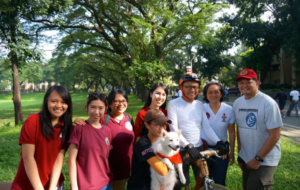Seventeen dogs and their human guardians caught the attention of the Sunday crowd at the University of the Philippines (UP) Diliman.
UP Diliman officials recently lifted the university ban on walking dogs along the academic oval to allow the group (and their dogs) their say for World Animal Day. The dog picnic at the UP Sunken Garden was jointly organized by the Office of the Vice-Chancellor for Community Affairs (OVCCA) and Friends of Campus Animals (FoCA UP) as a symbolic activity to initiate the shift to a humane campus.

The dogs met new doggie friends, bonded with their families, and socialized with students and curious onlookers. To demonstrate their commitment to responsible pet ownership, all dogs were on leashes, and their guardians came armed with poop bags and their canine companions’ anti-rabies vaccination cards.
“It felt good to…be with fellow dog lovers because it affirmed that there is indeed a community of dog lovers here like me,” said RJ Manalo, an administrative employee at the university’s radio station DZUP.
Manalo came to the picnic with her husband, who is a veterinarian, their two daughters (both studying at UP), and their dogs Ruffa, a ten-year-old white Lhasa Apso and Mocha, a sevenyear old toy poodle. “It was a rare family bonding activity,” she shared.
Vice Chancellor for Community Affairs Dr. Nestor Castro recalls that the ban on bringing pets to campus dates back to the 1990s, when a dog bit a jogger at the academic oval. All pets were banned from the campus as a result.
The dog picnic was a dream come true for the UP official, who came with his very energetic nine-month old Shar Pei. “When I was appointed Vice-Chancellor, the Chancellor asked me what was my pet project for the community… I said I want to make this a pet-friendly campus,” he told the crowd of about 100 pet owners, joggers, and bikers. “But I haven’t been able to implement this because there are a lot of problems,” he added.
Resistance came from some faculty members, other stakeholders, and even the Campus Maintenance Office (CMO), which falls under Castro’s jurisdiction. The CMO personnel didn’t like the idea of having to clean up after irresponsible pet owners, who tend to leave dog poop everywhere. But the canine picnic proved that dog lovers can be responsible enough to pick up after their animals.
Creating a humane campus
Animal companions, however, are the least of the officials’ problems at UP. In order to be recognized not only as a venue for intellectuals but also as a compassionate university, officials are seeking ways to manage the community animals in a humane manner. UPD Chancellor Michael Tan took a step in this direction when he recently suspended the order to round up community animals. He has since created an Animal Welfare Committee that will decide on humane and sustainable policies to control the feral and stray dog and cat populations on campus.
The OVCCA and FoCA are seeking ways to raise funds to spay and neuter the animals then return them to where they were taken as part of the university’s TNR (Trap-Neuter-Return) policy. It is hoped that controlling the stray and feral animal populations will reduce the incidence of animal cruelty on campus. There are an estimated 7,000 dogs in the UP community.
Previous administrations considered community animals as pests or threats. Dog catchers from both the university and the barangay automatically rounded them up, and most of them were killed at the Quezon City pound in Payatas. Manalo commented, in an effort to explain the round-up policy, that people may dislike animals due to bad experiences with them in the past; such experiences can lead to “…the misconception that all campus animals are dangerous and a threat.”
With help from the UP-based animal protection group FoCA, a campus-wide information and education drive is now in the works to convince UP employees, residents, students, and faculty members that animals and people can live in harmony in a campus setting.
Manalo longs for a return to the good old pet-friendly days. “There used to be a group of big dog lovers who met every other Sunday at the empty lot in front of Quezon Hall near the creek,” she reminisces. “We shared ideas on how to handle large breeds.”
Similar activities may soon be in the pipeline. Officials are now exploring the possibility of designating pet-friendly areas within the campus and specific days for inter-species bonding. So there soon could be a special “dog day afternoon” or a park for people and their animals.
“It is a process. We will secure suggestions as well as engage other stakeholders to see how to allay their fears and address their concerns,” Vice Chancellor Castro said.
This story appeared in Animal Scene’s December 2015 issue.






